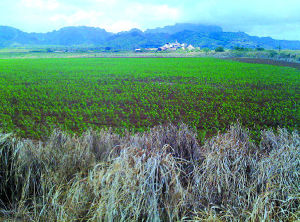14
Jan
Agrichemical Companies Sue to Halt Kauai Restrictions of GE Crops and Pesticides
(Beyond Pesticides, January 14, 2014) Agrichemical companies filed a lawsuit to stop Kauai County from moving ahead with its new law to restrict genetically engineered (GE) agriculture and toxic pesticide applications near schools, hospitals, homes, and shorelines. As the first Hawaiian Island to pass restrictions on pesticides and GE agriculture, Kauai County saw an unprecedented outpouring of public support for Bill 2491. Despite numerous attempts by agrichemical companies to derail the bill, including personal attacks on councilmembers, and in the face of a veto by Mayor Bernard Carvalho, the residents of Kauai prevailed when the County Council chose to override the Mayor’s veto and make Bill 2491 law. Kauai’s action for a safe and healthy community was followed in Hawaii County by Bill 113, which restricts new GE crops. Efforts in Maui County are now underway to enact protections similar to Kauai’s.
 The lawsuit, filed January 11 in U.S. District Court, attempts to block Bill 2491 from coming into law (it is currently set to go into effect 9 months after its passage), and was brought forward by agrichemical company giants DuPont, Syngenta, and Agrigenetics Inc., an affiliate of Dow Agrosciences. The suit does not come as a complete surprise to concerned residents on the island because agrichemical companies threatened litigation as early as the bill was introduced. Advocates say that this attack by the agrichemical industry proves that these companies were never interested in finding common ground, despite attempts by local leaders to reach a compromise.
The lawsuit, filed January 11 in U.S. District Court, attempts to block Bill 2491 from coming into law (it is currently set to go into effect 9 months after its passage), and was brought forward by agrichemical company giants DuPont, Syngenta, and Agrigenetics Inc., an affiliate of Dow Agrosciences. The suit does not come as a complete surprise to concerned residents on the island because agrichemical companies threatened litigation as early as the bill was introduced. Advocates say that this attack by the agrichemical industry proves that these companies were never interested in finding common ground, despite attempts by local leaders to reach a compromise.
“The ordinance is invalid,” said Syngenta spokesman Paul Minehart to Reuters. “It arbitrarily targets our industry with burdensome and baseless restrictions on farming operations by attempting to regulate activities over which counties in Hawaii have no jurisdiction.”
Bill 2491 mandates companies establish reasonable buffer zones around these sensitive sites in order to protect residents against the adverse impacts of pesticide drift. These simple, commonsense protections are intended simply to prevent incidents like the ones that occurred at Waimea Canyon Middle School in 2006 and 2007. After a number of complaints that pesticide sprayings were occurring while students were still in class, administrators and teachers sat down with Syngenta and secured an agreement from the company not to spray before school was out at 3:30 pm. Syngenta broke that promise, according to Maluhia Group, a coalition of Waimea Canyon Middle School staff, parents and community members. There’s even a YouTube video showing the event. Hawaii’s Department of Agriculture investigated the incidents, but came to the conclusion that Cleome gynandra, known on the islands as “stinkweed”, was the main culprit. However, concerned residents are not convinced, as there have never been any recorded medical incidents of widespread poisoning by stinkweed.
One of the main arguments made by agrichemical companies is that Kauai County is preempted by state law in its ability to enact restrictions on pesticide use or GE agriculture. As Beyond Pesticides pointed out in a recent Pesticides and You article titled “State Preemption Law,” Hawaii is one of seven states that do not have regulations that would preempt local ordinances from enacting requirements more strict than the state’s. A group of attorneys from organizations including Earthjustice and the Center for Food Safety have pledged to defend Kauai’s bill at no charge.
Beyond Pesticides continues to be an ardent supporter of Kauai’s commonsense protections from pesticides and their associated use on GE crops. Given the impending approval of GE crops designed to withstand applications of the highly toxic herbicide 2,4-D, these protections are more important than ever.
Despite industry claims to the contrary, the legacy of GE agriculture has not been increased crop yields and decreased pesticide use, but instead an exponential growth of herbicide resistant weeds that require increasingly toxic pesticides in order to control. Increasing the use of toxic pesticides requires counties where, as the agrichemical company’s lawsuit states, the “climate is uniquely conducive to Plantiffs’ business” to implement increased protections, particularly around schools where children learn, hospitals where the sick need to get better, and homes where people expect to live securely in good health.
For more information on the fight for pesticide protections in the Hawaiian Islands, see Beyond Pesticides’ past Daily News articles and read Beyond Pesticides’ testimony on Bill 2491. For more information on the failed promises of GE agriculture, read “Ready or Not, Genetically Engineered Crops Explode on Market,” or see Beyond Pesticides’ website on Genetic Engineering.
Source: Reuters
All unattributed positions and opinions in this piece are those of Beyond Pesticides











GMOs are a completely failed technology at every turn.
Since we don’t have leadership in either of our hopelessly corrupt parties, the America People will have to lead: Pesticides and herbicides and GMOs must be banned throughout the world.
These are hopelessly failed “technologies” that create wealth for only a few people.
If our species survives, our descendants will no doubt look upon this primitive technology and the “scientists” who created it as hopelessly stupid.
The same people who burned witches in the Middles Ages and beyond are still at it — creating pesticides, herbicides, fracking, and GMOs!
January 14th, 2014 at 3:33 pm